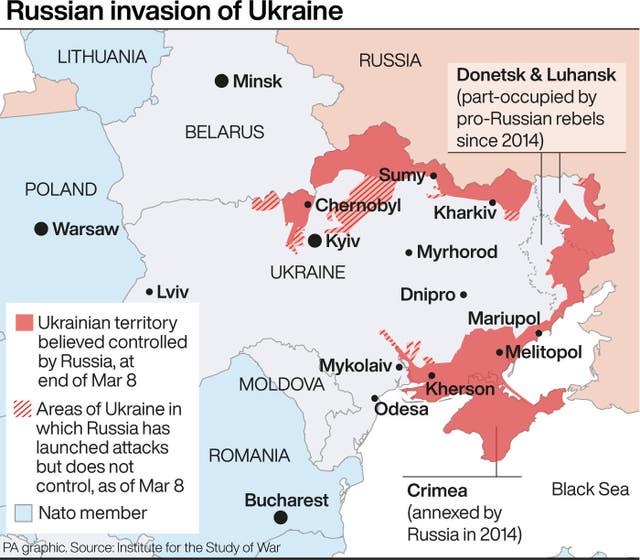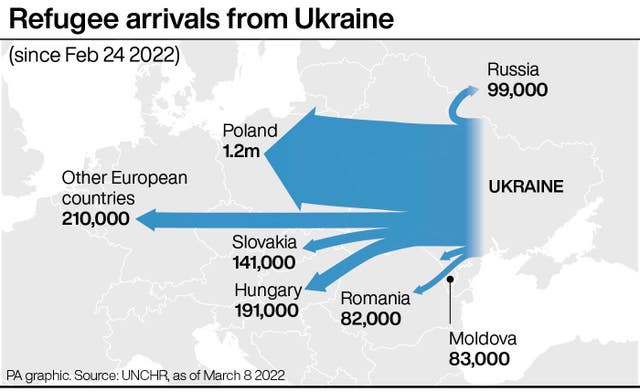A Russian attack severely damaged a maternity hospital in the besieged port city of Mariupol – wounding at least 17 people, Ukraine has said.
It comes as citizens trying to escape shelling on the outskirts of Kyiv streamed toward the capital amid warnings from the West that Moscow’s invasion is about to take a more brutal and indiscriminate turn.
The ground shook more than a mile away when a series of blasts slammed into the Mariupol complex, blowing out windows and ripping away much of the front of one building.
Police and soldiers rushed to scene to evacuate victims, carrying out a heavily pregnant and bleeding woman on a stretcher.
Another woman wailed as she clutched her child. In the courtyard, mangled cars burned, and a blast crater went at least two stories deep.
Ukraine’s President Volodymyr Zelensky wrote on Twitter there were “people, children under the wreckage” of the hospital and called the strike an “atrocity”.
Video footage shared by Mr Zelensky showed cheerfully painted hallways strewn with twisted metal and room after room with blown-out windows. Floors were covered in wreckage. Outside, a small fire burned and debris covered the ground.
Mariupol’s city council said on its social media site that the damage was “colossal”.
There are few things more depraved than targeting the vulnerable and defenceless.
The UK is exploring more support for Ukraine to defend against airstrikes and we will hold Putin to account for his terrible crimes. #PutinMustFail https://t.co/JBuvB78HVC
— Boris Johnson (@BorisJohnson) March 9, 2022
Authorities announced new ceasefires on Wednesday morning to allow thousands of civilians to escape from towns around Kyiv as well as the southern cities of Mariupol, Enerhodar and Volnovakha, Izyum in the east and Sumy in the northeast.
Previous attempts to establish safe evacuation corridors largely failed because of what the Ukrainians said were Russian attacks. But Russian President Vladimir Putin, in a telephone call with German’s chancellor, accused militant Ukrainian nationalists of hampering the evacuations.
It was not immediately clear whether anyone was able to leave other cities on Wednesday, but people streamed out of Kyiv’s suburbs, many headed for the city centre, even as explosions were heard in the capital and air raid sirens sounded repeatedly. From there, the evacuees planned to board trains bound for western Ukrainian regions not under attack.
Civilians trying to escape the Kyiv suburb of Irpin were forced to make their way across the slippery wooden planks of a makeshift bridge after the Ukrainians blew up the concrete span days ago to slow the Russian advance.
With sporadic gunfire echoing behind them, firefighters dragged an elderly man to safety in a wheelbarrow, a child gripped the hand of a helping soldier, and a woman inched her way along cradling a fluffy cat inside her winter coat. They trudged past a crashed van with the words “Our Ukraine” written in the dust coating its windows.
“We have a short window of time at the moment,” said Yevhen Nyshchuk, a member of Ukraine’s territorial defence forces. “Even if there is a cease-fire right now, there is a high risk of shells falling at any moment.”

In Mariupol, local authorities hurried to bury the dead in a mass grave. City workers dug a trench some 25 metres long at one of the city’s old cemeteries and made the sign of the cross as they pushed bodies wrapped in carpets or bags over the edge.
Nationwide, thousands are thought to have been killed, both civilians and soldiers, in the two weeks of fighting since Putin’s forces invaded. The UN estimates more than two million people have fled the country, the biggest exodus of refugees in Europe since the end of the Second World War.
The fighting knocked out power to the decommissioned Chernobyl nuclear plant, raising fears about the spent fuel that is stored at the site and must be kept cool. But the UN nuclear watchdog agency said it saw “no critical impact on safety” from the loss of power.
The crisis in Ukraine is likely to get worse as Russian forces step up their bombardment of cities in response to stronger than expected resistance. Russian losses have been “far in excess” of what Mr Putin and his generals expected, CIA director William Burns said on Tuesday.
An intensified push by Russian forces could mean “an ugly next few weeks”, Mr Burns told a congressional committee, warning that Mr Putin is likely to “grind down the Ukrainian military with no regard for civilian casualties”.
British Defence Secretary Ben Wallace echoed those comments on Wednesday, telling MPs Russia’s assault will get “more brutal and more indiscriminate” as Mr Putin tries to regain momentum.

Britain’s Ministry of Defence said fighting continued northwest of Kyiv. The cities of Kharkiv, Chernihiv, Sumy and Mariupol were being heavily shelled and remained encircled by Russian forces.
Russian forces are placing military equipment on farms and amid residential buildings in the northern city of Chernihiv, Ukraine’s military said. In the south, Russians in civilian clothes are advancing on the city of Mykolaiv, a Black Sea shipbuilding centre of 500,000 people, it said.
The Ukrainian military, meanwhile, is building up defences in cities in the north, south and east, and forces around Kyiv are “holding the line” against the Russian offensive, authorities said.
In Irpin, a town of 60,000, police officers and soldiers helped elderly residents from their homes. One man was hoisted out of a damaged structure on a makeshift stretcher, while another was pushed toward Kyiv in a shopping cart. Fleeing residents said they had been without power and water for the past four days.
Regional administration head Oleksiy Kuleba said the crisis for civilians is deepening in and around Kyiv, with the situation particularly dire in the suburbs.
“Russia is artificially creating a humanitarian crisis in the Kyiv region, frustrating the evacuation of people and continuing shelling and bombing small communities,” he said.

The situation is even worse in Mariupol, a strategic city of 430,000 people on the Sea of Azov that has been encircled by Russian forces for the past week.
Efforts to evacuate residents and deliver badly needed food, water and medicine failed on Tuesday because of what the Ukrainians said were continued Russian attacks.
The city took advantage of a lull in the shelling on Wednesday to hurriedly bury 70 people. Some were soldiers but most were civilians.
The work was conducted efficiently and without ceremony. No mourners were present. No families were there to say their goodbyes.
One woman stood at the gates of the cemetery to ask whether her mother was among those being buried. She was.




Comments: Our rules
We want our comments to be a lively and valuable part of our community - a place where readers can debate and engage with the most important local issues. The ability to comment on our stories is a privilege, not a right, however, and that privilege may be withdrawn if it is abused or misused.
Please report any comments that break our rules.
Read the rules here